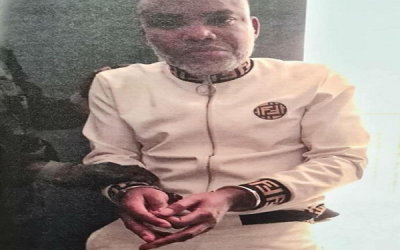Nigeria laws allow restricted terrorism trial for IPOB
The Nigerian government can try proscribed Indigenous People of Biafra (IPOB) leader, Nnamdi Kanu under stealth circumstances, sections of the laws.
Nigeria’s Terrorism Act of 2013 gives the court the powers to conduct such trial under more restrictive circumstances as is the case in certain parts of the country.
These laws are in line with global standards including those of the USA PATRIOT Act of 2001 – Sections 802-811.
According to the Practice Direction and Protocol of Terrorism (Prevention) (Amendment) Act 2013, Section 34 subsection 3, “The court may also decide, in the public interest and national security that (a) all or any of the proceedings pending before the court shall not be published in any manner; and (b) that such proceedings shall be adjourned and the accused persons detained pending when the Attorney-General is able to guarantee the protection of persons and witnesses safety of the witnesses and other persons involved in the matter.
Similarly, the Administration of Criminal Justice Act of 2015 (Section 233) subsection 1, “A trial for the offence referred to in subsection (4) of this section may not, where the court so determines, be held in an open court.
Subsection 2 adds that, “The names, addresses, telephone numbers and identity of the victims of such offences or witnesses shall not be disclosed in any record or report of the proceedings and it shall be sufficient to designate the names of the victims or witnesses with a combination of alphabets.
Subsection 3 provides more details on how proceedings will conducted. “Where in any proceeding the court deems it necessary or protect the identity of the victim or a witness, the court may take any or all of the following measures: (a) Receive evidence by video link; (b) Permit the witness to be screened or masked; (c) Any other measure that the court considers appropriate in the circumstance.
With regards to the safety of witnesses that will be called during the proceedings, “(Section 34 – “(1) states that, “the court may, on its own or on a motion by the Attorney-General or a relevant law enforcement or security agency, protect a witness or any person in any proceeding before it where it is satisfied that the life of the person or witness is in danger and take such measures as it deems fit to keep the identity and address of the witness or person secret.
According to subsection 2 of the same section, “The measures which the court may take under subsection (1) of this section may include the- (a) holding of the proceeding at a place to be decided by the court; (b) avoidance of the mention of the real name and address of the witness or person in its orders, judgments or records of the case, which are accessible to the public; or (c) issuing of a direction for ensuring that the identity and address of the witness or person are not disclosed; (d) undertaking the proceeding in camera in order to protect the identity and location of witnesses and other persons.”
In the case of Kanu, the Nigerian government vowed that a fair hearing will be conducted.
This is in line with Article 6(1) of the European Convention on Human Rights that states that, “In the determination of his civil rights and obligations or of any criminal charge against him, everyone is entitled to a fair and public hearing within a reasonable time by an independent and impartial tribunal established by law.
*Samson Umoru, a legal practitioner, writes in from Abuja


